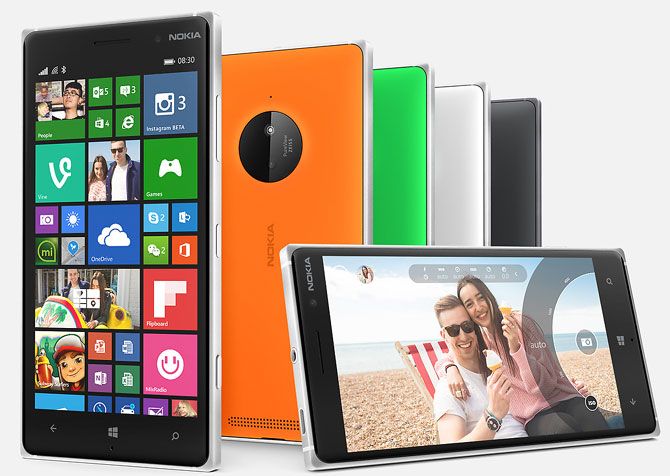
Software giant Microsoft on Thursday launched three new Lumia smartphones, including one designed for ‘selfie’ enthusiasts, in a bid to expand its portfolio as it battles the likes of Samsung and Apple in the booming, yet fiercely competitive, global smartphone market.
Microsoft has launched the Lumia 830, 735 and 730, priced at 330 euros (about Rs 26,190), 219 euros (about Rs 17,370) and 199 euros (about Rs 15,800), respectively, as it tries to build on its acquisition of Nokia's mobile division earlier this year.
All the handsets will begin rolling out globally this month.
Microsoft is also rolling out a software update called 'Lumia Denim' that adds functionality exclusively to Lumia phones running Windows Phone 8.
These will, however, not be available on Windows Phone 8 smartphones from other companies like HTC.
The flagship 830 will come with Windows Phone 8.1 with Lumia Denim operating system, 1 GB RAM, 16 GB internal user memory (15 GB OneDrive cloud storage and up to 128 GB micro SD card).
It has a 5-inch display, 1.2 GHz quad-core processor, 10 MP camera and 2,200 mAh removable battery.

The Lumia 730 has a quad-core 1.2 GHz processor with 1 GB of RAM and 4.7-inch display.
It has a rear camera of 6.7 MP, along with a 5 MP front-facing camera.
With 8 GB internal memory, the handset supports 15 GB OneDrive cloud storage and up to 128 GB micro SD cards.
"Our strategy is to help people do more with stunning products that unite and showcase the best of Microsoft's digital work and life experiences," Microsoft Corporate Vice-President, Mobile Devices Sales, Chris Weber said.

The Lumia 830, Lumia 735 and Lumia 730 Dual SIM combine popular Microsoft services such as Skype, Microsoft Office and OneDrive with amazing Lumia innovations in design and imaging to bring experiences that people value, at prices they can afford, he added.
Microsoft had acquired almost all handset and services business of Finnish firm Nokia for over $7.2 billion in April this year.
Once the world leader in mobile phones, Nokia lost its top place to South Korea's Samsung in 2012, especially as its rivals took the lead in the key smartphone market.
Even in emerging markets like India, where Nokia held a significant share, the company lost out to international rivals and domestic firms like Micromax and Karbonn.











 © 2025
© 2025